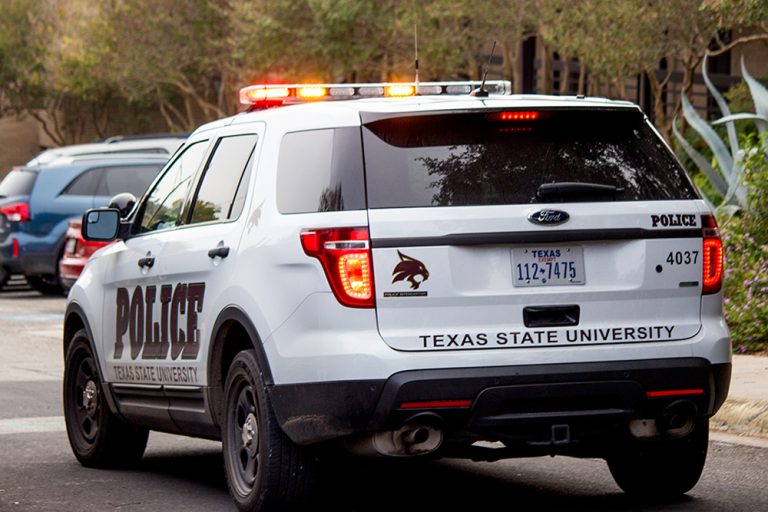

The former police chief at Texas State University and his top deputy were accused of hiring unqualified officers — including one who allegedly “slept with a sexual assault victim” while investigating her case — and presiding over a department marked by favoritism, low morale and high turnover, according to an internal university memo obtained by The Texas Tribune and police department correspondence.
Former Chief Jose Bañales and his chief of staff, Lt. Alex Villalobos, were also accused of overruling investigators who tried to flag problematic job applicants, according to the records.
In a separate lawsuit filed in early November, a 17-year department veteran claims he was fired for reporting “violations of law” committed by university employees, including falsification of documents by Bañales and Villalobos.
The lawsuit filed by Jason Moreno claims Villalobos also “used information obtained through his law enforcement position for personal benefit of a brother” — a former Cameron County District Attorney — “who had been charged with and convicted of racketeering and bribery.” He was investigated by the university for doing so in 2013.
Bañales and Villalobos both resigned from Texas State in mid-2018, and Villalobos is now a Kyle City Council member and is running for Hays County sheriff.
He previously told the Tribune that he resigned to pursue a new professional opportunity, and he did not respond to recent requests for comment.
Bañales, who owns a consulting company, denied many of the allegations in the university memo and questioned its veracity. He said he made strides at Texas State to rehabilitate a police force that had high turnover, lax processes and poor records management when he arrived.
He characterized the department veteran who’s sued as an aggrieved former employee who had fomented “deceptive” allegations against him.
“Very quickly when I got there, I found that it was a toxic environment with various factions within the department, and I did institute some more accountability in the hiring process,” Bañales said. “I would blame the leadership of the past for failing to recognize they had to formalize the process for that.
“A lot of these things happened prior to my tenure with Texas State, and we were putting things in motion to rectify some of these issues,” he said.
Bañales left the university, in part, because he felt he didn’t have final authority over new hires and personnel matters, he said. His predecessor, Ralph Meyer, said the department followed the university’s rules on hiring during his tenure and that Bañales did not.
The accusations come as Texas State is under review by federal authorities for grossly underreporting the number of rapes and other crimes on campus during Bañales’ and Villalobos’ tenure.
The university — one of the largest public higher education institutions in Texas — could face steep fines for violating a federal statute that requires accurate crime reporting so students and parents can assess campus safety.
School officials are making reforms, and a new police chief was brought on last February.
In a statement, the university said the memo summarizes “unsubstantiated allegations brought forward by members of the university police department” in April 2018 — a month before Bañales resigned — and that “many of the individuals referenced in the document” are no longer employed there.
Asked about Moreno’s lawsuit, the university declined to comment on pending litigation.
Texas State’s police force protects more than 38,000 students, most enrolled at the picturesque main campus in San Marcos, south of Austin.
Police employees operate a nighttime ride service and offer other safety programs, but officers are also expected to respond to incidents as serious as bomb threats, homicides and active shooters. All are issued weapons.
Texas State hired Villalobos — who owned a private investigation company called Intrepid Intel Research, in Kyle — in 2007.
His annual reviews at the university were overwhelmingly positive, and he was promoted to the rank of lieutenant in October 2016, five months after Bañales was hired.
A LinkedIn profile bearing Villalobos’ name shows he became the chief of staff around the same time.
In a 2017 email to local Hays County prosecutors, Bañales said Villalobos had received “verbal counseling” after a 2013 university investigation found he used a law enforcement search tool for personal purposes.
At some point, Villalobos’ name was added to a register kept by Hays County prosecutors to flag people whose character could be questioned if they are put on the witness stand in court cases.
Many prosecutors keep similar lists — often referred to as Brady lists. Bañales said he never received confirmation that Villalobos was on the local list and that the investigation happened years before he arrived.
Hays County District Attorney Wes Mau would not discuss details of his office’s list but said it is a “39.14 disclosure list,” meaning it includes more names than might appear on other prosecutors’ Brady lists.
This story was originally published by the Texas Tribune.
The San Marcos City Council received a presentation on the Sidewalk Maintenance and Gap Infill…
The San Marcos River Rollers have skated through obstacles after taking a two-year break during…
San Marcos Corridor News has been reporting on the incredible communities in the Hays County…
Visitors won't be able to swim in the crystal clear waters of the Jacobs Well Natural…
Looking to adopt or foster animals from the local shelter? Here are the San Marcos…
The Lone Star State leads the nation in labor-related accidents and especially workplace deaths and…
This website uses cookies.